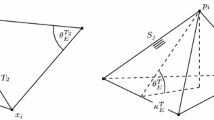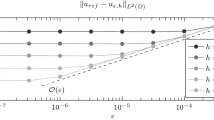Abstract
This paper is concerned with a priori error estimates for the piecewise linear finite element approximation of the classical obstacle problem. We demonstrate by means of two one-dimensional counterexamples that the \(L^2\)-error between the exact solution u and the finite element approximation \(u_h\) is typically not of order two even if the exact solution is in \(H^2(\varOmega )\) and an estimate of the form \(\Vert u - u_h\Vert _{H^1} \le {Ch}\) holds true. This shows that the classical Aubin–Nitsche trick which yields a doubling of the order of convergence when passing over from the \(H^1\)- to the \(L^2\)-norm cannot be generalized to the obstacle problem.





Similar content being viewed by others
References
Baiocchi, C.: Estimation d’erreur dans \(L^\infty \) pour les inéquations à obstacle. In: Mathematical Aspects of Finite Element Methods: Proceedings of the Conference held in Rome, 10–12 December 1975, pp. 27–34. Springer, Berlin (1977)
Christof, C.: \(L^\infty \)-error estimates for the obstacle problem revisited. Calcolo (2017). https://doi.org/10.1007/s10092-017-0228-1
Ciarlet, P.G.: Lectures on the Finite Element Method. Tata Institute of Fundamental Research, Bombay (1975)
Falk, R.S.: Error estimates for the approximation of a class of variational inequalities. Math. Comput. 28, 963–971 (1974)
Glowinski, R.: Lectures on Numerical Methods for Non-Linear Variational Problems. Tata Institute of Fundamental Research, Bombay (1980)
Kinderlehrer, D., Stampacchia, G.: An Introduction to Variational Inequalities and Their Applications. SIAM, Philadelphia (2000)
Meyer, C., Thoma, O.: A priori finite element error analysis for optimal control of the obstacle problem. SIAM J. Numer. Anal. 51, 605–628 (2013)
Mosco, U., Strang, G.: One-sided approximation and variational inequalities. Bull. Am. Math. Soc. 80, 308–312 (1974)
Mosco, U.: Error estimates for some variational inequalities, mathematical aspects of finite element methods. Lect. Notes Math. 606, 224–236 (1977)
Natterer, F.: Optimale \(L_2\)-Konvergenz finiter Elemente bei Variationsungleichungen. Bonner Mathematische Schriften 89, 1–13 (1976)
Nitsche, J.: \(L^\infty \)-convergence of finite element approximations. Lect. Notes Math. 606, 261–274 (1977)
Noor, M.A.: Finite element estimates for a class of nonlinear variational inequalities. Int. J. Math. Math. Sci. 16(3), 503–510 (1993)
Steinbach, O.: Boundary element methods for variational inequalities. Numer. Math. 126(1), 173–197 (2014)
Strang, G.: One-sided approximation and plate bending, computing methods in applied sciences and engineering part 1. Lect. Notes Comput. Sci. 10, 140–155 (1974)
Suttmeier, F.-T.: Numerical Solution of Variational Inequalities by Adaptive Finite Elements. Vieweg-Teubner, Wiesbaden (2008)
Acknowledgements
We would like to thank the two anonymous reviewers for their helpful suggestions and comments.
Author information
Authors and Affiliations
Corresponding author
Appendix: Unilateral FE-approximation in one dimension
Appendix: Unilateral FE-approximation in one dimension
In this section, we construct the unilateral finite element approximations that are needed in the proof of Proposition 8. The underlying analysis essentially goes back to Mosco and Strang, cf. [8, 14]. For the convenience of the reader, we shortly recall the arguments in the following.
Theorem A1
Let \(\varOmega \) be an open bounded interval and assume that \(\{\mathcal {T}_h\}_{0< h < h_0}\) is a family of partitions of \(\varOmega \) such that \(ch< \mathrm {diam}\,T < \min (Ch, \mathrm {diam}\,\varOmega )\) holds for all \(T \in \mathcal {T}_h\) and all \(0< h < h_0\) with constants \(c, C > 0\) independent of h. Let
and suppose that \(z \in H_0^1(\varOmega ) \cap W^{2,q}(\varOmega )\), \(1< q < \infty \), is a given function. Then, there exist constants \(C_1, C_2\) and \(C_3\) independent of h and functions \(\{z_h\}_{0< h < h_0}\) satisfying \(z \le z_h \in V_h^0\) for all \(0< h < h_0\) such that
and
holds for all \(0< h < h_0\).
Proof
In what follows, we will always identify z with its \(C^1(\overline{\varOmega })\)-representative. To prove Theorem A1, we consider for an arbitrary but fixed \(0< h < h_0\) the optimization problem
where \(\mathcal {C}_h\) denotes the set of all vertices of the partition \(\mathcal {T}_h\). Using standard techniques from finite-dimensional optimization, it is easy to see that (22) admits at least one global minimum \(z_h\). From the definition of (22), it follows that the function values \(z_h(x)\), \(x \in \mathcal {C}_h\), of such a minimum cannot be decreased without violating the constraint \(z \le z_h\). This implies that for every node \(x \in \mathcal {C}_h {\setminus } \partial \varOmega \) with adjacent mesh cells \(T_l = [x_l, x]\) and \(T_r = [x, x_r]\) one of the following has to be true:
-
(a)
It holds \(z_h(x) = z(x)\).
-
(b)
There exists an \(a \in [x_l, x_r] {\setminus } \{x\}\) such that \(z_h(a) = z(a)\) and \(z_h'(a) = z'(a)\). If \(a \in \{x_l, x_r\}\), we mean the left (resp., right) limit of the derivative here.
If (b) is the case, then the fundamental theorem of calculus yields
and if (a) is true (or \(x \in \partial \varOmega \)), it trivially holds \(z_h(x) - z(x) = 0\). Thus, we obtain that \(z_h\) satisfies
Here, \(I_h: H_0^1(\varOmega ) \rightarrow V_h^0\) again denotes the Lagrange interpolation operator. From (23) and the piecewise linearity of the functions in \(V_h^0\), it readily follows
Combining (24) with the triangle inequality and standard error estimates for the Lagrange interpolant yields (21). Further, we obtain from (23) that
Summation over all \(T \in \mathcal {T}_h\) now yields
Using again the triangle inequality and standard interpolation error estimates, we obtain the first estimate in (20). To prove the \(W^{1,q}\)-estimate, note that
Proceeding as in case of the \(L^q\)-error now gives the second estimate in (20). \(\square \)
It should be noted that in higher dimensions, it is still possible to prove \(L^\infty \)-error estimates for unilateral approximations provided the function z under consideration possesses enough regularity. We refer to [2] for details.
Rights and permissions
About this article
Cite this article
Christof, C., Meyer, C. A note on a priori \(\mathbf {L^p}\)-error estimates for the obstacle problem. Numer. Math. 139, 27–45 (2018). https://doi.org/10.1007/s00211-017-0931-5
Received:
Revised:
Published:
Issue Date:
DOI: https://doi.org/10.1007/s00211-017-0931-5




